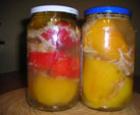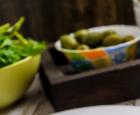Nativity fast: when it begins, the essence of fasting, what and when you can eat, signs. Christmas fast and nutrition
At the beginning of the fast I feel normal and physically tolerate the fast normally, but by the end I can barely stand it. When I fasted for the first time during the Nativity Fast, I got a stomach ache, so I broke the fast. How to eat during fasting if you get sick during fasting?
Archpriest Alexander Ilyashenko
Yes, if they arise serious problems with health, then the fast can be weakened (with the blessing of the priest), but there is no need to bring yourself to such a state. After all, judging by your letter, your problems are not because of your health, but because you are too lazy to cook during Lent.
The Lenten table can be varied, tasty, and healthy. By the way, for a sick stomach, oatmeal cooked in water is very useful - what’s wrong with that? On our website there are recipes for lenten dishes, there are even special cookbooks, if you would like to cook!
***
Is it possible to drink alcohol during fasting?
During multi-day fasts, on some days a more strict fast is prescribed, on others some relaxations are permissible. So alcoholic drinks in moderate quantities are acceptable on Saturdays and Sundays, as well as on days of commemoration of the most revered saints. During the Nativity Fast, fish is also allowed on these days. But this general rules, and the measure of fasting for everyone should be determined individually in a personal conversation with the priest. God help you!
Sincerely, Archpriest Alexander Ilyashenko
***
I try to keep the fast, but when I come to visit relatives or friends, I am not treated at all Lenten dishes. What should I do in this case? And also, is it true that in such cases it is impossible to refuse food and openly say that I am fasting? In such cases, I usually eat a small portion of non-fasting food, and from the next day I continue fasting. Am I doing the right thing?

Priest Antony Skrynnikov
It all depends on the situation. If your relatives know that you are fasting, then by eating a modest meal, you can tempt them. They will decide that your faith and fasting are superficial, which you can easily give up on occasion. The Apostle Paul says that “if food makes my brother stumble, I will never eat meat, lest I cause my brother to stumble.”
On the other hand, it happens that a refusal to eat something, especially something prepared for you, may be perceived by the hosts of the table as an insult and will cause offense. In this case, it is better to sacrifice one day of fasting than human relationships.
Sincerely, priest Antony Skrynnikov
***
Please tell me how to determine the golden mean in fasting - between gluttony (both gluttony and guttural insanity), lust of the flesh and crazy fanatical excess in fasting, that is, how to fast in a normal way.

Priest Dionisy Svechnikov
Everyone must determine their own measure of abstinence, preferably in consultation with a priest. What is madness for one is commonplace for another, and what is lust for one is the norm of life for another. All people are different. And the Church shows us in its charter the ideal of fasting. You can fast according to the rules - God help you! If you can’t, fast as best you can, but don’t accuse someone who can of fanaticism. The main thing is not to give up some food during fasting, but to learn to abstain. Abstinence not only in food, but also in words, in actions, in deeds.
Sincerely, priest Dionisy Svechnikov
***
I don't have the willpower to fast in relation to food. When I don't eat meat, I become angry and irritable, rude. I know that the main thing in fasting is not only abstaining from food, but a more in-depth look into oneself, trying to correct something in oneself with God’s help, and yet... It’s probably easier for me not to watch a movie or TV again than not to eat meat. Well, what should I do, since I am such a spiritual invalid, I can’t even read the rules regularly, it’s too much... I can’t do anything regularly. Sometimes I even have thoughts that Orthodoxy is not for me, but I cannot live without Christ, without Communion (even if it is infrequent).
First of all, we should not resign ourselves to the fact that we are “spiritually disabled” and recognize this condition as our only possible one until the end of time. The fight against one’s passions and weaknesses is, in fact, the purpose of fasting. And entering such a struggle and winning it is possible only after regular and difficult “training”, and, of course, with the help of God.
You write about irritability. But this applies not only to you, this applies to many people - this is a fairly common reaction. But this irritability does not appear from fasting, but manifests itself thanks to fasting - that is, it is not something that comes only during fasting, but something that is always in us for one reason or another, just thanks to some restrictions this sin is more pronounced manifests itself. Just one of the goals of fasting is to identify certain sins in oneself and fight against them.
It is useless to fight weeds by tearing off only their leaves, but leaving the roots in the ground - the weed will sprout again, and the root will strengthen during this time. You cannot fight irritability by “feeding” it meat - you need to look for its real cause and fight it. The post exposes our weak spots”, allows us to see and feel them more clearly, and therefore the natural reaction should not be the desire to “hide” these ulcers again, but to make efforts to remove them forever.
Of course it's long and difficult path, and it is better to start it together with an experienced guide - a priest, who will tell you where exactly you should start this path, discuss with you the results of the first steps, and tell you where and how to move on. Therefore, I advise you to go to church and discuss questions about fasting in a personal conversation with the priest, tell him about your problems and ask for advice on how best to accustom yourself to fasting and overcome irritability and rudeness. God's help to you in this difficult struggle!
Sincerely, Archpriest Alexander Ilyashenko
How can you protect yourself from the painful consequences of breaking the Nativity Fast incorrectly? What and when can you eat?
Features of the Nativity Fast

Stages of leaving fast
Leave the post should be taken for 1-2 weeks, especially for people with chronic diseases. There is no need to suddenly load your body with regular food; gradually switch to normal nutrition.
- The first couple of days after fasting, it is better not to include meat in the diet; a piece of boiled chicken or other lean meat is allowed, for example beef tongue. You can start consuming low-fat dairy products: milk, yogurt (preferably homemade), sandwich with butter(with red caviar or cheese). Hard-boiled or soft-boiled eggs are allowed, just not fried and no more than 1-2 pieces. Vegetable dishes are recommended fluffy rice, boiled potatoes. Fresh baked goods are not recommended - Christmas bread should be eaten from yesterday. Immediately after fasting, it is recommended to drink no more than 100-200 g of wine.
- On days 3-4 you can include low-fat meat dishes, for example, steamed cutlets, boiled chicken breast. It is recommended to eat, for example, white bread in combination with boiled potatoes and meat. Help the body absorb animal protein.
- After a week, you can return to your usual diet. But if you have chronic diseases, then it is better to be careful for a few more days so that the body can fully return to its usual routine.
Hieromonk of the St. Daniel Monastery, Micah: “You have to be careful when breaking fast, because it happens that people fast, pray, exercise, but a holiday has come, the tables are crowded, a person stuffs his belly with all this, and problems begin. Everything typed in the post is lost. We have to go out carefully. You can taste food in moderation, you can eat everything, but you need to do it little by little.
Overeating and drunkenness bring a person back, but a spiritual holiday, first of all, a person should rejoice spiritually. When we consume food in moderation and drink a little, then the soul can pray after the meal, but when you overeat or get drunk, then there is no time for prayer, and everything that a person has acquired in 40 days, he loses.”

Consume proteins of animal origin, they are easily absorbed and digested by the body. Can be included in the diet white fish, abundantly watered lemon juice, which replaces stomach acid.
eat in the morning.
- To improve the production of gastric juice, include pickles, seasonings, and strong broths in your diet.
- Listen to your body. If you experience bloating, rumbling, colicky pain, passing gas with odor, or feeling unwell, you should consult a doctor and follow a gentle diet.
- Immediately after breaking the Nativity Fast, consume no more than one meal in one meal. protein product. Combine easy-to-digest proteins to keep your digestive system intact.
- Consumption of enzyme medications is contraindicated. Digestive system She may not be able to recover from fasting on her own if you start “helping” her.
From today, the 40-day Nativity fast begins for Orthodox believers. He is called to cleanse the body and soul of the laity. One of the components of fasting is fast food. We will have to give up the meat and dairy that many people love.
For those who plan to start adhering to the Nativity fast in 2018, this will come in very handy. Read our article about what is allowed and what is prohibited to eat during Lent.
- Daily nutrition calendar for the laity
When does the Nativity fast begin?
Every year, the Christmas fast begins exactly 40 days before the bright holiday. Start date: November 28, 2018. End date: January 6, 2018. Lay people who adhere to fasting know that November 27 is the last day when you can eat those foods that will be prohibited for 40 days.

It is worth noting that on November 27, according to Orthodox calendar- Memorial Day of the Apostle Philip. Some believers call November 27th Philip Day.
Daily nutrition calendar for the laity
For believers who decide to adhere to the Nativity Fast 2018-2019, we invite you to get acquainted with detailed description what you can eat by day:


What foods should you avoid for 40 days?
For lay people who adhere to the Nativity Fast 2018-2019, it is important to follow the daily nutrition calendar and not eat the following foods:

Meat;
eggs;
dairy products;
wine;
vegetable oil(cannot be consumed on Wednesday, Friday and some other days);
fish (on some days it is allowed to eat fish).
Important! To people suffering chronic diseases, you must consult your doctor before taking the fast. The same applies to pregnant women, children and disabled people.
These categories of believers can partly eat as dictated by the rules of fasting. As a rule, their diet is subject to partial adjustment, which is carried out exclusively by the attending physician.
Features of nutrition at the time of the New Year's Eve
The question of what the nutritional calendar should be like for New Year on the Nativity Fast 2018. Are there any exceptions for the holiday menu?

According to the old Orthodox calendar, Christmas is celebrated on December 25th. According to the new calendar, the holiday begins on January 7. This means that the laity have to adhere to the basics of fasting for almost 2 weeks longer. Temptations await believers at every step. At this time, it is important to keep yourself within limits and complete the fast.
The onset of the New Year is a particularly difficult moment for those believers who fast. Orthodox world just getting ready to break his fast, but secular society practices this. According to the church, on New Year's Day you should not indulge yourself and eat forbidden foods.
Advice! Believers who are in doubt about how to eat during Lent should consult with the priest in the church.
On Tuesday, November 28, Orthodox Christians begin the Nativity Fast, which will continue into the next year and end on January 6.
The fast lasts 40 days and is one of the strictest in Orthodoxy. Only the Great and Dormition fasts are stricter than it. During this period, the church does not hold weddings or baptisms.
Why fast before Christmas?
Winter Lent serves as preparation for believers for the Nativity of Jesus Christ. This is a period of repentance and prayer. Believers must cleanse themselves before the feast of the coming of the Son of God into our world.
While limiting yourself in food, you need to fast spiritually at the same time. The priests say that without prayer it is not fasting, but simple diet. Believers must avoid manifestations of passions and vices, eradicate evil deeds, forgive offenses, and also abstain from sex, entertainment and entertainment events.
Metropolitan Anthony of Boryspil and Brovary wrote about the meaning of the post on Facebook a few days ago.
"Lent is always a time of change. Everyone sets some goals for themselves for a given period. The goals are different, large and small. It all depends on the spiritual maturity of the person: some plan to attend church services more, others gather their courage to read in the morning and in the evening prayer rule instead of short prayers, still others are trying to strictly observe fasting, and some will give up sweets during this time...
When setting goals, we must clearly understand why we are going to do something. If our plans do not have Christ, they will not change our life, our soul. You can just as easily use fasting for weight loss and dieting, which is what some do. This post is for someone else."
“Those who cannot fast fully, before starting the fast, should approach the priest, explain the situation and receive a blessing to relax the fast. Usually, based on the state of a person’s health and the circumstances of his life, the priest helps establish such a measure of fasting that “a person can do it,” Metropolitan Anthony also said.
He called to follow the example of the Old Testament righteous who were preparing to meet the Savior. "Cleansing your souls with fasting, prayer, good deeds, we must now become like those Old Testament righteous people who lived in difficult conditions, were surrounded by the hopeless darkness of sin, human cruelty, ignorance, and at the same time, with sincere purity of faith, continued to wait for the Messiah. Without a shadow of a doubt, they believed and expected that He would come who would be more beautiful than all the sons of men (Ps. 44:3). Who will love righteousness and hate iniquity (Ps. 44:8),” reminds Anthony.
What can you eat during the Nativity Fast?
The menu for the Nativity Fast can be varied. It is well known that you can eat bread and its derivatives: for example, crackers. As well as cereals, vegetables, berries, any greens, fruits and dried fruits, mushrooms.
Legumes, nuts, and seeds are allowed. Sweets include sugar and honey.
As for protein and fatty foods, on some days you can eat fish, seafood, and butter. Below it will be clear which ones.
The main stages of the Nativity Fast
The fast is divided into three stages, depending on which the nutrition changes slightly.
The first lasts until December 19 - this is the holiday of St. Nicholas the Wonderworker. As usual for fasting, Monday, Wednesday and Friday are the strictest days. You can only eat raw food that has not been heated or cooked. On such days it is ideal to eat vegetables, fruits, nuts, mushrooms, honey.
On other days, you can eat hot food with any vegetable oil. And on weekends, diversify the menu with fish and a moderate amount of wine.
The next stage of fasting is stricter. It lasts until January 1st. We eat the same things, excluding fish and wine on Saturdays and Sundays.
The strictest stage - and Christmas
The third stage lasts until Christmas Eve - January 6th. It is a little stricter than the previous one. Hot food is available on Tuesday, Thursday, Saturday and Sunday. But we add oil (only vegetable oil) to food only on weekends.
On Christmas Eve, January 6, you cannot eat all day - until the first star. After this, the festive dinner begins with kutya. It is prepared from whole wheat or rice - with honey, fruits (usually dry), poppy seeds and nuts.
But it’s easy to endure them: firstly, this is not a strict fast, and you can often eat fish, and secondly, the anticipation of a bright, wonderful holiday helps.
Also, during the Nativity Fast, you can use vegetable oil, and those who have tried to cook without it do not need to explain how important it is and how it helps diversify their diet. So the Nativity Fast, although it limits the observant in the choice of products, at the same time provides great opportunities for culinary creativity.
As with any other fast, we refuse eggs, dairy products and warm-blooded meat. From everything that is called modest.
Beginning of the post
The first day is November 28th and it is Saturday. November 27 is Friday, a traditional fast day. So, in fact, you need to give up fast food a day earlier. And November 26th was the last opportunity to eat a chop before Christmas.
What and when to eat
There are two traditions of fasting: monastic and secular. The first, of course, is more strict. Let's start with it:
Monday - hot lean food without oil is allowed.
Tuesday and Thursday - you can eat hot lean food with butter.
Wednesday and Friday - dry eating, you can eat only lean foods that have not been processed heat treatment, and bread.
Saturday and Sunday - fish and hot food with vegetable oil are allowed.
Observing fasting according to monastic tradition requires the blessing of one’s confessor.
So we, non-monastery residents, will not have to fast so strictly: we will often be able to eat fish and vegetable oil. This greatly distinguishes Rozhdestvensky from other more strict fasts, when dry eating is prescribed on some days, while oil, that is, vegetable oil, can only be used on weekends.
In December you can eat like this:
Monday, Wednesday, Friday - hot food with vegetable oil.
Tuesday-Thursday - fish and hot food in oil are allowed.
Saturday and Sunday and also holidays- fish, wine and vegetable oil are allowed.
The last, sixth week of fasting is the strictest. From January 2, from Saturday, to Tuesday, January 6, fish is no longer eaten, and on Monday, Wednesday and Friday of the last week, vegetable oil is excluded from the diet. And, of course, no wine.
Last day of fasting
January 6 - Christmas Eve. On this day, it is prescribed to abstain from food until the first star. After its appearance, you can satisfy your hunger with juice: wheat grains boiled in honey or boiled rice with dried fruits.
Holidays in Lent
During the Nativity Fast, two major holidays are celebrated: December 4 - Entry into the Temple Holy Mother of God, and December 19 is the day of remembrance of St. Nicholas.
On these days, fasting people are allowed fish and vegetable oil. December 19 this year is Saturday, when both wine and fish are allowed as is. But December 4th is Lenten Wednesday, and you can replenish your strength with a fish dish and a glass of wine.
Lenten New Year
To please the frail New Year's dishes those who carefully observe traditions and fast according to all the rules will not succeed. December 31st is Thursday, you can still eat fish, but you can’t drink wine. And on January 1, you need to completely give up fish dishes. So we'll have to wait for Christmas.




 Delicious dishes with sausages
Delicious dishes with sausages A glimpse of Bella. Romantic chronicle. A glimpse of genius. Messerer about Akhmadulina Boris Messerer glimpse of Bella romantic chronicle
A glimpse of Bella. Romantic chronicle. A glimpse of genius. Messerer about Akhmadulina Boris Messerer glimpse of Bella romantic chronicle I dreamed that I was sailing on a boat on the river
I dreamed that I was sailing on a boat on the river How to cook beef entrecote in a frying pan
How to cook beef entrecote in a frying pan